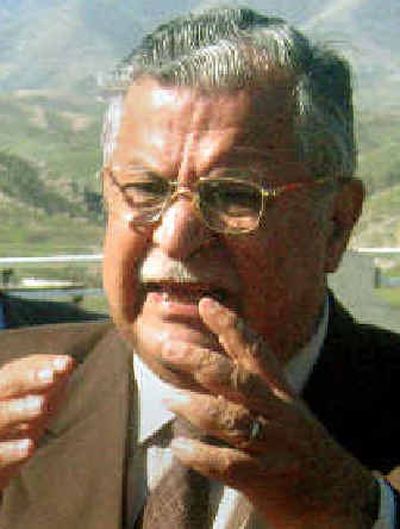Iraq’s factions agree on president

BAGHDAD, Iraq – Ousted dictator Saddam Hussein will be able to watch from his Baghdad jail cell as Iraq’s newly elected parliament chooses a new president today, the next step in building Iraq’s first democratically elected government in 50 years, Iraqi officials said.
Lawmakers put the finishing touches Tuesday on an agreement making Kurdish leader Jalal Talabani president and Shiite Adel Abdul-Mahdi and interim President Ghazi al-Yawer, a Sunni Arab, his two vice presidents.
On Thursday, the 275 lawmakers elected Jan. 30 likely will name Shiite leader Ibrahim al-Jaafari prime minister, clearing the way for lawmakers to begin focusing their attention on writing a permanent constitution by their Aug. 15 deadline.
The new, interim government will lay the foundation for future elections and a permanent government – all key to an eventual U.S. withdrawal.
The U.S. military said four service members were killed Monday and Tuesday in one of its biggest losses in recent weeks. As of Monday, at least 1,536 members of the U.S. military have died since the beginning of the Iraq war in March 2003, according to an Associated Press count.
In Washington, President Bush said Iraqis were increasingly joining the fight against terrorists like Abu Musab al-Zarqawi, the head of al Qaeda in Iraq.
“The American people ought to take heart to know that we have now more allies in defeating these few, and those allies are the Iraqi citizens,” he said.
Interim Vice President Rowsch Nouri Shaways said Saddam will be able to see the parliamentary session from his jail cell, although it was unclear if the broadcast will be live or taped. U.S. military officials declined to comment.
“This is a very important session because this is the first time in Iraq’s history that the president and his deputies are elected in a legitimate and democratic way by the Iraqi people,” he said. “That’s why the Iraqi government thought it would be beneficial that the former dictator see this unique process.”
Saddam was captured north of Baghdad in December 2003 and has been in custody with several of his top henchmen at a U.S.-guarded detention facility near Baghdad’s international airport. U.S. military officials transferred the 12 defendants to Iraqi custody in June with the transfer of sovereignty.
Saddam will be tried before the Iraqi Special Tribunal established in late 2003. The tribunal has given no official dates for starting trials.
As U.S. officials have slowly begun to return control of the troubled nation to Iraqi security and government officials, insurgents are targeting Iraqis along with U.S. troops.
In one tape posted Tuesday by al Qaeda in Iraq, a man in his 20s, identified as Iraqi soldier Jassim Mohammed Hussein Mahdi, was beheaded for working with the U.S.-allied government.
The authenticity of the tape, posted on a militant Web site that carries most al Qaeda in Iraq statements, could not immediately be verified.
The man was shown squatting on the ground in an empty room, wearing full military gear with his hands tied behind his back.
“God’s verdict against this renegade, who was tempted by dollars, has been carried out,” said a statement shown on the tape. “Let everyone who sold his religion and joined this unit know that he will have the same fate.”
The video later showed the man lying blindfolded on the ground before two masked men appeared. One held the victim’s legs while the other severed his head with a knife as shouts of “God is great!” were heard off-camera.
Al Qaeda in Iraq has claimed responsibility for beheading numerous Western hostages and members of the Iraqi security forces.
“Their strategy hasn’t really changed; their strategy has been one to kill as many innocent people as they possibly can in the hopes that it shakes our confidence and shakes our will and, equally importantly, shakes the will and confidence of those brave souls who are helping lead … this new democracy,” Bush said Tuesday.
A second video posted on the same Web site by another group, Ansar al-Sunnah Army, showed a man who said he worked as an informer for police in the northern city of Mosul.
The man, who identified himself as Hussein Taha Qassim and said he was born in 1968, told an interrogator he informed the police about the hideouts of four insurgents. He said the police killed three of the insurgents while the fourth escaped.
In the next image, he was shown lying face-down on the median of a two-way avenue, and a masked gunman used an automatic weapon to shoot him several times.
This video’s authenticity could not be verified either. Ansar al-Sunnah has claimed to have kidnapped and killed several foreigners.
An explosion Monday in the sprawling western province of Anbar killed one Marine, while two U.S. soldiers and one Iraqi soldier died in a joint attack on dozens of insurgents in eastern Diyala province that lasted into Tuesday. Two U.S. soldiers also were wounded in the attack, a military spokesman said.
Another U.S. soldier was killed Tuesday in Baghdad when an abandoned taxi exploded on an expressway near an American patrol. Four others were wounded, said Sgt. 1st Class David Abrams, a spokesman for Task Force Baghdad.
A blast in the capital’s Amiriyah neighborhood targeted a joint Iraqi-U.S. convoy, al-Amil police Capt. Talib Thamir said. Abrams said there was an explosion but he did not have any details.
As night fell, a blast near a university in the capital injured five people, police said.
In Mosul, a car bomb injured five U.S. soldiers and damaged a Stryker troop transport vehicle, Capt. Mark Walter said.
After that incident, soldiers accidentally shot a CBS News freelance cameraman in the hip, he said. Both CBS and the U.S. military said the camera was mistaken for a weapon.